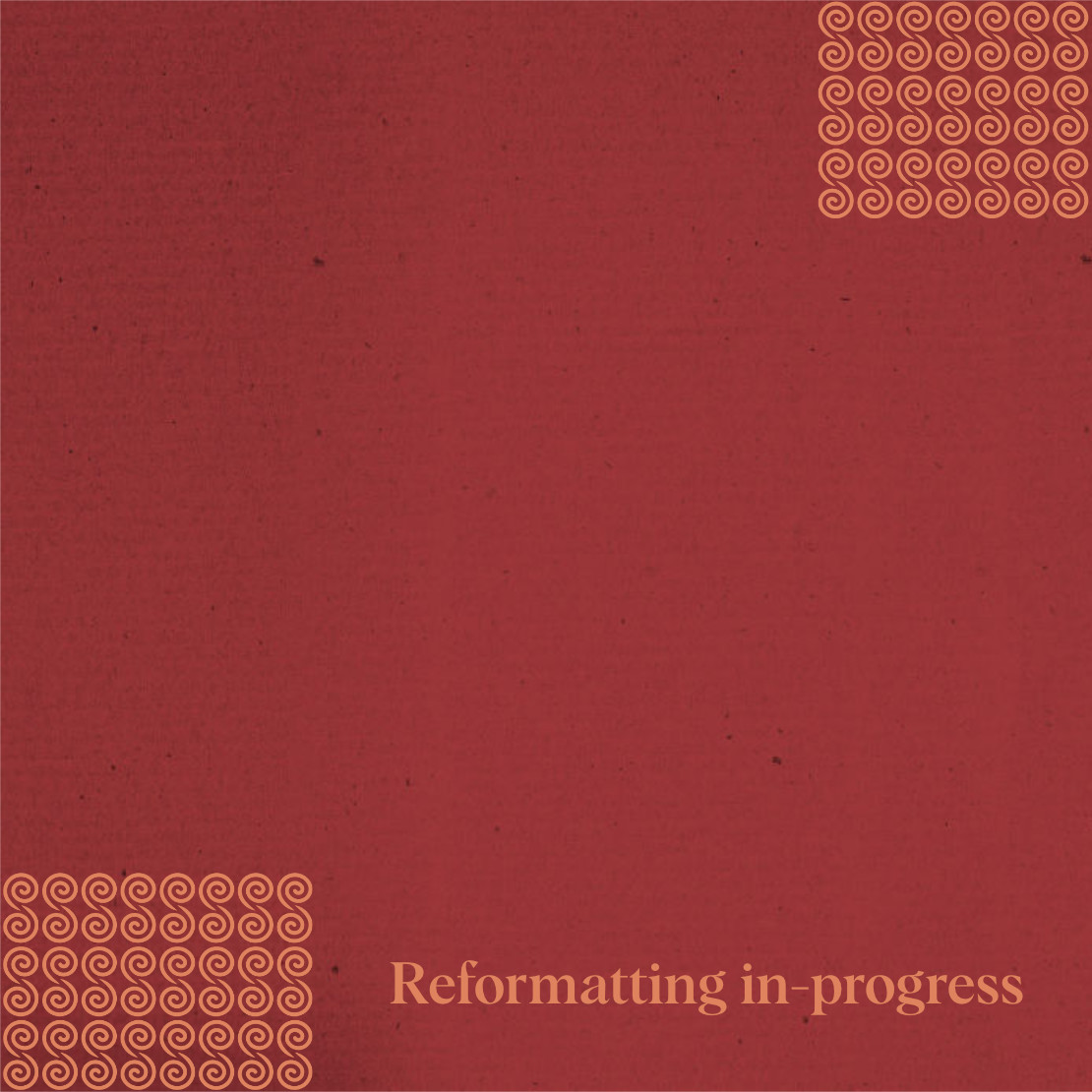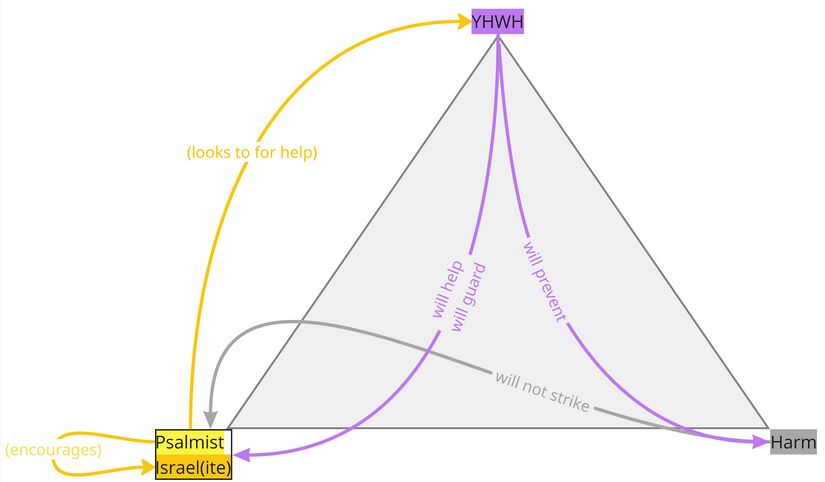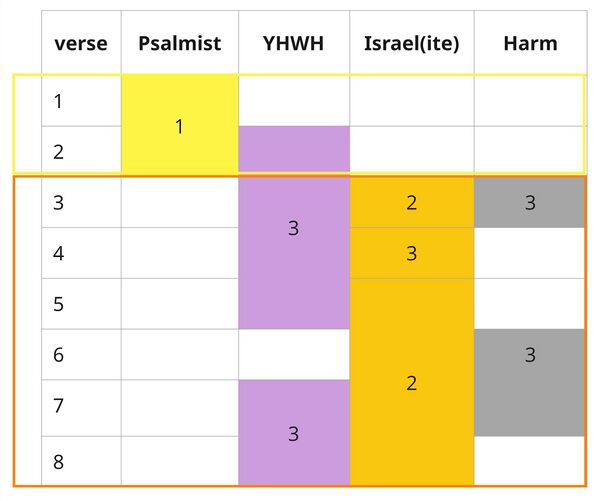Psalm 121 Participant Analysis
From Psalms: Layer by Layer
Psalm 121/Participant Analysis
Choose a PsalmNavigate Psalm 121
Participant Analysis
Participant Analysis focuses on the characters in the psalm and asks, “Who are the main participants (or characters) in this psalm, and what are they saying or doing? It is often helpful for understanding literary structure, speaker identification, etc.
For a detailed explanation of our method, see the Participant Analysis Creator Guidelines.
There are 4 participants/characters in Psalm 121:
Profile List
| Psalmist |
| YHWH |
| "YHWH" (vv. 2, 5ab, 7, 8) |
| "The one who made heaven and eart" (v. 2) |
| "The one who guards you" (vv. 3, 5) |
| "The one who guards Israel" (v. 4) |
| "Your shade" (v. 5) |
| Israel(ite) |
| "Israel" (v. 4) |
| Harm |
| "slip" (lit.: "the slipping") (v. 3) |
| "the sun" (v. 6) |
| "the moon" (v. 6) |
| "harm" (v. 7) |
Profile Notes
- The psalmist is an anonymous Israelite who looks to YHWH for help and encourages other Israelites to do the same.
- The interchange between "the one who guards you" (vv. 3b, 5a) and "the one who guards Israel" (v. 4) suggests that the second-person singular addressee is Israel, or an individual Israelite representing the whole people.[1] The use of the singular instead of the plural emphasizes YHWH's protection is for each and every Israelite.
- The "antagonist" slot in this psalm is filled by all of those things that might threaten an Israelite's well-being (specifically, on his pilgrim journey to Jerusalem): "slipping" (v. 3), "sun" and "moon" (v. 6), and "all harm" (v. 7). The first reference to harm is earthly (v. 3), the second is heavenly (v. 6), and the third is all encompassing (v. 7).
- YHWH is both "the one who guards you / the one who guards Israel" (vv. 3–5) and "the one who made heaven and earth" (v. 2). As the creator of the universe, he is able to guard his people from all harm, whether earthly or heavenly.
| Hebrew | Line | English |
|---|---|---|
| שִׁ֗יר לַֽמַּ֫עֲל֥וֹת | 1a | Song of the Ascents |
| אֶשָּׂ֣א עֵ֭ינַי אֶל־הֶהָרִ֑ים | 1b | I lift my eyes toward the mountains. |
| מֵ֝אַ֗יִן יָבֹ֥א עֶזְרִֽי׃ | 1c | Where will my help come from? |
| עֶ֭זְרִי מֵעִ֣ם יְהוָ֑ה | 2a | My help is from YHWH, |
| עֹ֝שֵׂ֗ה שָׁמַ֥יִם וָאָֽרֶץ׃ | 2b | the one who made heaven and earth. |
| אַל־יִתֵּ֣ן לַמּ֣וֹט רַגְלֶ֑ךָ | 3a | May he not let your foot slip! |
| אַל־יָ֝נ֗וּם שֹֽׁמְרֶֽךָ׃ | 3b | May the one who guards you not doze off! |
| הִנֵּ֣ה לֹֽא־יָ֭נוּם וְלֹ֣א יִישָׁ֑ן | 4a | Indeed, the one who guards Israel will not doze off and will not fall asleep. |
| שׁ֝וֹמֵ֗ר יִשְׂרָאֵֽל׃ | 4b | the one who guards Israel |
| יְהוָ֥ה שֹׁמְרֶ֑ךָ | 5a | YHWH is the one who guards you. |
| יְהוָ֥ה צִ֝לְּךָ֗ עַל־יַ֥ד יְמִינֶֽךָ׃ | 5b | YHWH is your shade over your right hand. |
| יוֹמָ֗ם הַשֶּׁ֥מֶשׁ לֹֽא־יַכֶּ֗כָּה | 6a | During the day, the sun will not strike you, |
| וְיָרֵ֥חַ בַּלָּֽיְלָה׃ | 6b | nor the moon at night. |
| יְֽהוָ֗ה יִשְׁמָרְךָ֥ מִכָּל־רָ֑ע | 7a | YHWH will guard you from all harm. |
| יִ֝שְׁמֹ֗ר אֶת־נַפְשֶֽׁךָ׃ | 7b | He will guard your life. |
| יְֽהוָ֗ה יִשְׁמָר־צֵאתְךָ֥ וּבוֹאֶ֑ךָ | 8a | YHWH will guard your going out and your coming in |
| מֵֽ֝עַתָּ֗ה וְעַד־עוֹלָֽם׃ | 8b | from now until forever. |
- The speech situation in Psalm 121 is unclear. Scholars debate about the number of speakers, the points at which speaker-shifts occur, and the identity of the addressee(s). For a more detailed discussion of some of the issues, The Voice(s) in Psalm 121. In short, we argue that there is one speaker throughout the whole psalm. The shift to second-person singular in vv. 3–8 is a rhetorical device.
- The interchange between "the one who guards you" (vv. 3b, 5a) and "the one who guards Israel" (v. 4) suggests that the second-person singular addressee is Israel, or an individual Israelite representing the whole people.[2] The use of the singular instead of the plural emphasizes YHWH's protection is for each and every Israelite.
- The use of second-person singular forms to address a group is a common rhetorical device in the Hebrew Bible. The Ten Commandments are expressed as second-person singular commands, because they apply to each and every individual.[3] Similarly, the Book of Deuteronomy alternates between second-person singular and second-person plural. De Regt argues that these shifts correlate with the content: "When Israel is addressed about its history... the address forms tend to be plural. But when the subject matter is cultic or ritual (particularly when the commandments are detailed), most of the address forms are singular."[4]
Participant Relations Diagram
The relationships among the participants may be abstracted and summarized as follows:




